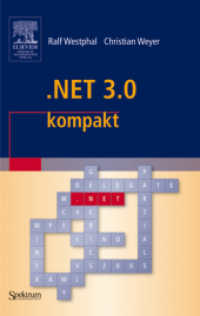Full Description
The first edition of Tally's Corner, a sociological classic selling more than one million copies, was the first compelling response to the culture of poverty thesis—that the poor are different and, according to conservatives, morally inferior—and alternative explanations that many African Americans are caught in a tangle of pathology owing to the absence of black men in families. The debate has raged up to the present day. Yet Liebow's shadow theory of values—especially the values of poor, urban, black men—remains the single most parsimonious account of the reasons why the behavior of the poor appears to be at odds with the values of the American mainstream.
While Elliot Liebow's vivid narrative of "street-corner" black men remains unchanged, the new introductions to this long-awaited revised edition bring the book up to date. Wilson and Lemert describe the debates since 1965 and situate Liebow's classic text in respect to current theories of urban poverty and race. They account for what Liebow might have seen had he studied the street corner today after welfare has been virtually ended and the drug economy had taken its toll. They also take stock of how the new global economy is a source of added strain on the urban poor. Discussion of field methods since the 1960s rounds out the book's new coverage.
Contents
Chapter 1 Foreword to the 2003 Edition
Chapter 2 Foreword to the 1967 Edition
Chapter 3 Chapter 1: Introduction to the 2003 Edition
Chapter 4 Chapter 2: Men and Jobs
Chapter 5 Chapter 3: Fathers without Children
Chapter 6 Chapter 4: Husbands and Wives
Chapter 7 Chapter 5: Lovers and Exploiters
Chapter 8 Chapter 6: Friends and Networks
Chapter 9 Chapter 7: Conclusion
Chapter 10 Appendix: A Field Experience in Retrospect







